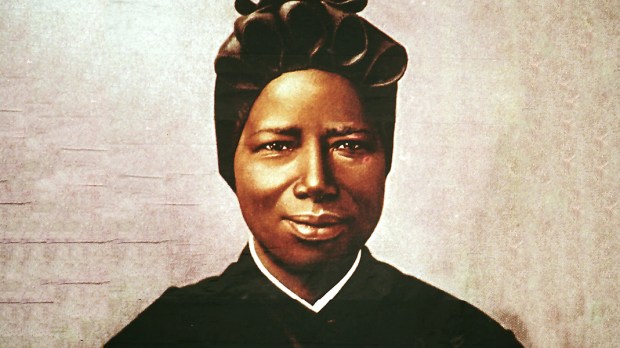Recently at Dappled Things Magazine, where I’m on the editorial board, we had an art competition in honor of St. Josephine Bakhita. The competition was completed not long ago and a winner was chosen — a really beautiful piece of artwork. Between that and the actual feast day of Josephine, which falls on February 8, she’s been on my mind. She lived a life like no other.
Born in the Sudan in 1869, Josephine was kidnapped as a young girl and sold into slavery. Thirteen years later, she was freed and migrated to Italy where she converted to Catholicism and became a religious sister. She lived an exemplary life and was canonized a saint in the year 2000.
Josephine displays the courage of an irrepressible soul. To rise from slave to saint is beyond impressive. It would have been easy to give up, seek revenge, or allow hate to poison her life, but she refused to allow the wounds of the past to destroy her future.
Josephine, simply as a woman, as a human being, as a saint, is admirable. She is peerless. She also happens to be an example of the diversity of the communion of saints. Living, as I do, in the United States, it’s all too easy to forget that the whole world doesn’t look like my parish church. The Catholic Church is truly universal, and our diversity is our strength.
The saints are uniquely themselves, people who are fully alive. Saints are not boring. They don’t look alike, think alike, or talk alike — quite the opposite. The more saintly they become, the sharper the distinctions between them. No one would ever confuse St. Josephine with St. Thomas Aquinas, or St. Philip Neri with St. Therese the Little Flower. These distinctions between them don’t become sources of division, but rather, they are the reason the saints love each other. The diversity they possess is like a harmony that creates a beautiful song.
Ever since I became Catholic and realized what a big, riotous crowd of different saints and pilgrims the Church contains, who live and pray in worship styles from all parts of the world, past and present, I’ve been seeking more diversity in my life because I want my everyday life to imitate what I see in the Church. To this end, when a number of years ago my wife and I were searching for a house to buy, we intentionally shopped in neighborhoods that had a high level of diversity and walkability. We wanted a neighborhood where people walked their dogs at night and pushed their stroller past our house while we sat on the front porch and watched the children play. We wanted to know our neighbors, to have random encounters with all sorts of different people and make new friends. We were excited to have neighbors who would bring with them a variety of life experience and cultural backgrounds.
We finally found the perfect house in an urban neighborhood with lots of diversity. Living here has contributed to our knowledge of the world and broadened our experience and ability to empathize. We go to the playground and many of the children there look different, dress different, play different, talk different than we do – and my kids play with them and we all have a wonderful time. This is a gift that our neighborhood has given to our family.
I have to admit, there’s always, along with the joy of it all, also an element of internal resistance, mild judgment, and shock. This is what I’m learning, slowly, every day to reconcile within myself. Often, my resistance is simply because I see people doing things differently than I’m used to. It surprises me and my first reaction is negative. I’m figuring out, though, how to accept that, while not everything is automatically good simply because it’s different, I need to take the time to understand before I put up my internal defenses.
St. Josephine and her sainthood is a beautiful example of how our diversity — the ways in which all of us are a little bit different and know no one is quite like me or you — is a mark of the strength of community. We contribute each in our own way, unafraid to be exactly who we are and who God means us to be, and by doing so uncover a common dignity.
This is something I’ll continue to wrestle with as I struggle each day to live in community. Even within my immediate family there is diversity that ought to be celebrated. None of my children is exactly like me, and that can cause anxiety but ultimately is quite wonderful. My parishioners all have different opinions, different backgrounds, different preferences, and that diversity makes our parish stronger. My neighborhood is full of old-timers, new-comers, immigrants, families, single people, and social classes. Because of that it’s a delightful place to live and raise our family.
I suppose the real lesson that is becoming painfully clear is that not everyone has to be just like me. We don’t have to be like all of our neighbors. We don’t need to be like St. Josephine, or any other saint. We just need to be ourselves.

Read more:
5 Ways to honor the saints of February in your life and home

